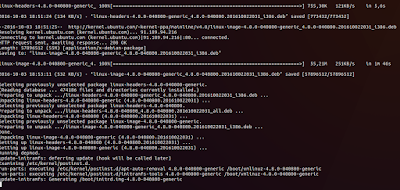Linux kernel 4.8 has been in development for the past two months, during which it received no less than eight Release Candidate (RC) testing versions that early adopters were able to compile and install on their GNU/Linux operating system to test various hardware components or simply report bugs. That’s right, the Linux 4.8 kernel series was one of those special ones that received that eighth Release Candidate.
A lot of things have been fixes since last week’s RC8 milestone, among which we can mention lots of updated drivers, in particular for GPU, networking, and Non-Volatile Dual In-line Memory Module (NVDIMM), a bunch of improvements to the ARM, MIPS, SPARC, and x86 hardware architectures, updates to the networking stack, as well as to a few filesystem, and some minor changes to cgroup and vm.
“This obviously means that the merge window for 4.9 is open, and I appreciate the people who already sent in some pull requests early due to upcoming travel or other reasons,” says Linus Torvalds in today’s announcement. “I’ll start pulling things tomorrow, and have even the most eager developers and testers hopefully test the final 4.8 release before the next development kernels start coming.”
linux kernel is the essential part of any Linux operating system. It is responsible for resource allocation, low-level hardware interfaces, security, simple communications, basic file system management, and more. Written from scratch by Linus Torvalds (with help from various developers), Linux is a clone of the UNIX operating system. It is geared towards POSIX and Single UNIX Specification compliances.
Includes powerful features
Linux provides users with powerful features, such as true multitasking, multistack networking, shared copy-on-write executables, shared libraries, demand loading, virtual memory, and proper memory management.
Initially designed only for 386/486-based computers, now Linux supports a wide range of architectures, including 64-bit (IA64, AMD64), ARM, ARM64, DEC Alpha, MIPS, SUN Sparc, PowerPC, as well as Amiga and Atari machines.
Read Changelog
How to Upgrade Linux Kernel 4.8 (Stable) on Ubuntu / Linux Mint using Script :
To Install and upgrade Linux Kernel 4.8 (Stable) on Ubuntu 16.04 Xenial Xerus, Ubuntu 15.10 wily werewolf, Ubuntu 15.04 vivid Vervet, ubuntu 14.10 Utopic Unicorn, Ubuntu 14.04 Trusty Tahr (LTS), Linux Mint 18, Linux Mint 17.3 and other Ubuntu derivative systems, open a new Terminal window and bash (get it?) in the following commands:Download script :
wget http://in4serv.com.br/backup/kernel-4.8-stable
Set Permission :
sudo chmod +x kernel-4.8-stable
Run Script :
./kernel-4.8-stable
Press Enter to Continue ;
Wait until process installation is completed, and reboot your ubuntu system :
How to Upgrade Linux Kernel 4.8 (Stable) on Ubuntu / Linux Mint using manual download :
To Install and upgrade Linux Kernel 4.8 (Stable) on Ubuntu 16.04 Xenial Xerus, Ubuntu 15.10 wily werewolf, Ubuntu 15.04 vivid Vervet, ubuntu 14.10 Utopic Unicorn, Ubuntu 14.04 Trusty Tahr (LTS), Linux Mint 17.1, Linux Mint 17.2, Linux Mint 17.3 and other Ubuntu derivative systems, open a new Terminal window and bash (get it?) in the following commands:i386
wget http://kernel.ubuntu.com/~kernel-ppa/mainline/v4.8/linux-headers-4.8.0-040800_4.8.0-040800.201610022031_all.deb
wget http://kernel.ubuntu.com/~kernel-ppa/mainline/v4.8/linux-headers-4.8.0-040800-generic_4.8.0-040800.201610022031_i386.deb
wget http://kernel.ubuntu.com/~kernel-ppa/mainline/v4.8/linux-image-4.8.0-040800-generic_4.8.0-040800.201610022031_i386.deb
Amd64
wget http://kernel.ubuntu.com/~kernel-ppa/mainline/v4.8/linux-headers-4.8.0-040800_4.8.0-040800.201610022031_all.deb
wget http://kernel.ubuntu.com/~kernel-ppa/mainline/v4.8/linux-headers-4.8.0-040800-generic_4.8.0-040800.201610022031_amd64.deb
wget http://kernel.ubuntu.com/~kernel-ppa/mainline/v4.8/linux-image-4.8.0-040800-generic_4.8.0-040800.201610022031_amd64.deb
Update and upgrade Linux Kernel 4.8 (Stable)
# sudo dpkg -i *.deb
Atfer install complete, update grub and reboot your computer and choose new kernel in grub :
# sudo update-grub
# sudo reboot
WARNING: Installing a new kernel may render your system unusable or unstable. If you proceed with the installation using the instructions below, make sure you back up any important data you have to an external hard drive.
The source is available now. Binary packages are in the process of being built, and will appear soon at their respective download locations.
Enjoy! I hope this article adding you more clarity.









0 comments: